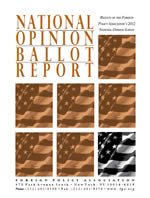Indonesia Key U.S. Ally in Asia

Americans participating in the Great Decisions annual National Opinion Ballot express strong support for closer ties amid China's rise
By Tyler Benedict
Indonesia represents a unique case study for the global community. In the last 15 years, it has thrown off the yoke of an authoritarian government and made remarkable strides politically, economically and socially. Although Indonesia is the world's most populous Muslim-majority nation, the government and security apparatus has refused to engage with radical Islamists or other terrorist groups. However, Indonesia is still a young democracy that faces considerable challenges as a developing country. From a foreign policy perspective, how should the United States engage with Indonesia?
As Indonesia begins to take a more assertive role in international and regional affairs, it has focused primarily on democracy promotion. The Bali Democracy Forum was founded by Indonesia, and it currently is a member of the G-20. Indonesia's growing regional influence combined with its commitment to democracy makes it, in the minds of some, a natural ally for the U.S., which is currently balancing delicate relations with China, India, South Korea and Japan. The U.S. government has made it a priority to reach out to Indonesia in recent years, something respondents in the Foreign Policy Association's National Opinion Ballot Report generally view favorably. According to the NOBR, 67% of Great Decisions participants support prioritizing U.S.-Indonesia relations relative to other allies in Southeast Asia (that is, Japan, South Korea and Taiwan). Such expansion of relations should focus on trade and economic development (39% of balloters) as well as regional stability (46% of balloters).
However, some foreign policy observers are quick to point out that Indonesia still lags behind its neighbors in health, education and other social indicators, marking it as a developing country. On the other hand, economic growth remains sound, and there is a strong possibility that Indonesia will achieve greater political stability as the country continues to move forward. In such a context, what role does foreign aid serve? Some argue that Indonesia no longer requires assistance from the U.S., since it has ostensibly completed the process of democratization and appears largely sound. NOBR respondents, however, do not seem to agree: 64% of balloters say that Indonesia still "needs assistance from the U.S. or the international community."
The landscape in Indonesia is still uncertain, but the country is largely "in a good place," according to Great Decisions author James Castle. It remains to be seen how the budding friendship between the U.S. and Indonesia will fare, but this relationship is one to watch in the coming decades.






